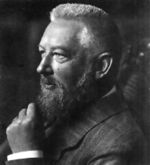No subscription or hidden extras
Read through the most famous quotes from Wilhelm Ostwald
; Jespersen O. Leipzig. Energetische Grundlagen der Kulturwissenschaft (1st ed.
Ostwald Jacobus Henricus van 't Hoff and Svante Arrhenius are usually credited with being the modern founders of the field of physical chemistry. He received the Nobel Prize in Chemistry in 1909 for his work on catalysis chemical equilibria and reaction velocities.

